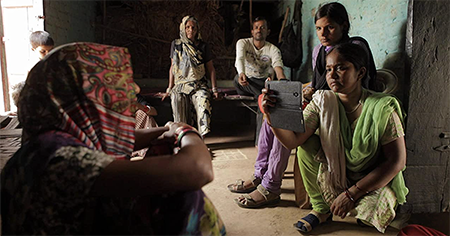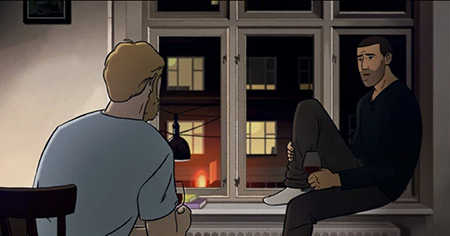
review | The Edge of Democracy
This Oscar-nominated Netflix film is less a documentary than a personal journal about Brazil’s tentative hold on democracy
by Dennis Burger
January 28, 2020
The Edge of Democracy is one of the most infuriating, frustrating, and foreboding films I’ve seen in ages but also one of the most compelling, and without a doubt the most haunting. Had it been your typical faux-objective political documentary, I’m not sure that would have been the case. But in telling the story of Brazil’s relatively recent political struggles, filmmaker Petra Costa makes no pretenses about objectivity. What she’s really telling here is her own story—a story about watching her civilization collapse around her.
Right from the giddy-up, Costa lays all of her cards on the table. Her parents were revolutionaries who fought against the military dictatorship that ruled Brazil between 1964 and 1985. She was only five when the country officially returned to democracy in 1988. Her first vote in a national election was cast for Luiz Inácio Lula da Silva. The ideology of Partido dos Trabalhadores, the Worker’s Party, runs through her veins.
As such, when she began documenting the crumbling of Brazil’s fragile democracy, starting with the impeachment of Dilma Rousseff in 2015, she didn’t do so dispassionately, with the eye of a historian. More than anything, The Edge of Democracy centers on her own frustrations, sense of foreboding, fury as she watches her country being torn apart by partisanship, fueled by the corruption of oligarchs and the malfeasance of the media.
You wouldn’t think this would be fodder for twists and turns, but it is. Rather than plot twists, though, the film dwells in personal, emotional twists. There’s the revelation, for example, that Costa has just as many familial ties to the oligarchs at the center of the corruption scandal that rocked the country as she does to revolutionaries.
That adds another shade of gray to a very personal story that’s all shades of gray, really. It’s a story told with nuance, but also with passion. More than anything, though, what impresses me is Costa’s ability to deftly and clearly straddle the line between the specific and the general. She never fails to articulate the unique failures of the Brazilian political and judicial system that make all of this a distinctly Brazilian problem. On the other hand, she clearly illuminates some universal truths about the ways in which any representative government can devolve into plutocracy and then autocracy through demagoguery and manufactured consent.
The rhythm with which she oscillates between these two perspectives is frighteningly effective. Just as I started to settle into a “Phew, that couldn’t happen here” sense of security, Costa blindsided me with a stark reminder that, yeah, it totally could. The tempo and pacing of the film are also aided by deft editing and a non-linear unfolding of the story that emphasizes both the personal, emotional trauma this film represents, as well as its effectiveness as a warning to the rest of the world.
Much of the imagery that comprises the film is taken from archival film footage and TV broadcasts, some of it from source tapes and some of it from cell phones pointed at TV screens, mixed with handheld video that looks to be prosumer level and drone shots interspersed throughout for flavor. It definitely makes for a visually interesting film, though not one you’ll watch as demo material. Netflix HD transfer does the imagery justice, and is almost never the weak link in the delivery chain, except in those cases where a few seconds here and there of original footage might have benefited from high dynamic range and an expanded color gamut.
The Dolby Digital Plus 5.1 soundtrack unsurprisingly leans heavily on the center channel, with the mix focusing primarily on Costa’s narration (provided in your choice of English or Portuguese, although even if you opt for the former, the bulk of the audio is still in Portuguese with subtitles).
The sound design does occasionally get a little big for its britches, especially in its overuse of the surround channels to convey the chaos of celebratory crowds or demonstrations. I can’t help but suspect that what we’re getting here is a theatrical sound mix not a nearfield mix made for home theaters, but the good news is that such overemphasis on surround sound is generally limited to scenes without narration or even dialogue so it’s hard to grump about it. It never interferes with the telling of the story, although it does intrude on moments that could have served as a prompt for quiet reflection.
No matter. I haven’t stopped thinking about The Edge of Democracy since I saw it so I’ve had plenty of opportunities to reflect on my own time. It’s a rare political documentary I think I’ll revisit on occasion, not due to the revelation or illumination contained within its 121-minute runtime—although there is plenty of that—but more due to the fact that it’s simply one of the most engrossing and intimate human dramas I’ve seen in ages, genre be damned.
Dennis Burger is an avid Star Wars scholar, Tolkien fanatic, and Corvette enthusiast who somehow also manages to find time for technological passions including high-end audio, home automation, and video gaming. He lives in the armpit of Alabama with his wife Bethany and their four-legged child Bruno, a 75-pound American Staffordshire Terrier who thinks he’s a Pomeranian.
PICTURE | Netflix’ HD transfer does the imagery justice and is almost never the weak link in the delivery chain, except when a few seconds of original footage might have benefited from high dynamic range and an expanded color gamut
SOUND | The Dolby Digital Plus 5.1 soundtrack unsurprisingly leans heavily on the center channel but does occasionally overuse the surround channels to convey the chaos of celebratory crowds or demonstrations
© 2025 Cineluxe LLC





